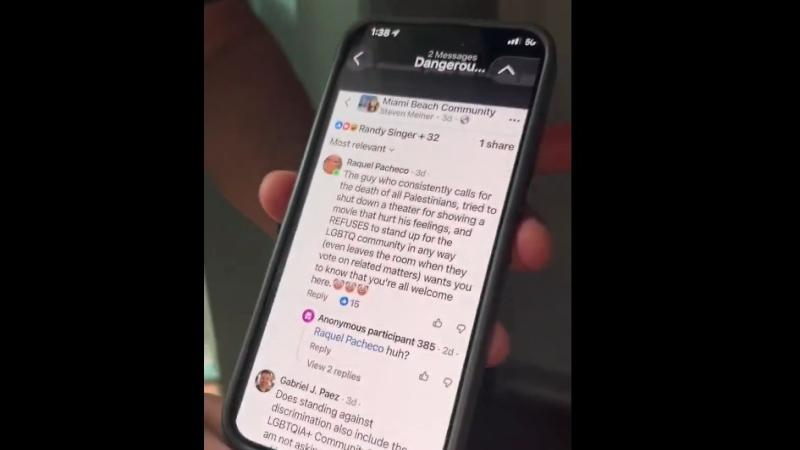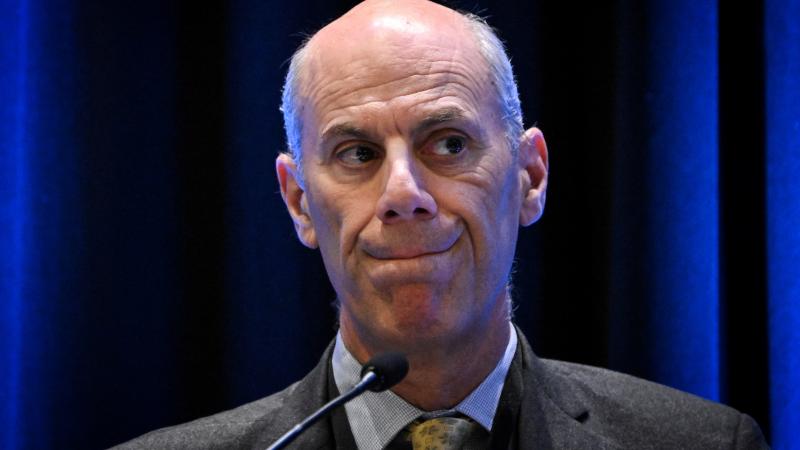Democrats' hypocrisy on federal pressure to censor frustrates effort to stop Trump saber-rattling
"It begins with censorship, it moves to the destruction of statues and monuments, and it ends with the murder of people," CEO of demonetized conservative publisher tells lawmakers at hearing on how Biden "jawboned Big Tech."
Congressional Democrats are hitting a major roadblock in their quest to stop the Trump administration's threats against broadcast networks and TV stations based on their editorial decisions: GOP reminders of their hypocrisy going back to the first Trump administration.
Senate Commerce Committee Republicans at Wednesday's hearing on how the Biden administration "jawboned Big Tech" into censoring speech emphasized their peers supported the White House's unrelenting pressure on social media platforms and even asked the FCC in 2018 to review Sinclair's broadcast license for "deliberately distorting news."
Smarting from the verbal jousting over whose actions are worse, the majority and minority appeared to approach consensus that what's good for the goose is good for the gander, and perhaps it's time for legislation to attach real penalties for such fowl censorship.
Chair Ted Cruz, R-Texas, plans to offer legislation to "codify protections against government-driven censorship, and make it easier for consumers to win monetary damages in lawsuits," he told The Wall Street Journal ahead of Wednesday's hearing.
Cruz: "Mafioso tactics"
He rebuked FCC Chair Brendan Carr for "mafioso" tactics by insinuating ABC affiliates could face licensing troubles if they kept airing Jimmy Kimmel's talk show, after the host speculated that alleged Charlie Kirk assassin Tyler Robinson was part of the "MAGA gang."
Cruz referred back to that several days later in releasing a committee report alleging the prior administration's Cybersecurity and Infrastructure Security Agency, with "little pushback" from internal oversight, violated the First Amendment "by developing internal systems to monitor and flag online speech that was not politically aligned with the previous administration."
House Judiciary Committee Republicans said Cruz himself was a target of state and local election officials using a CISA-funded portal to "silence critics and political opponents" in the name of reporting misinformation, alleging in the GOP members' summer 2023 report that CISA tried to hide its "unconstitutional outsourcing" of censorship.
Filling the committee chair for Cruz, Sen. Eric Schmitt, R-Mo., was quick to correct misleading claims by committee Democrats that the Supreme Court rejected his lawsuit, as Missouri attorney general, against the Biden administration's jawboning of Big Tech to censor disfavored narratives on COVID-19, elections and Hunter Biden's abandoned laptop.
SCOTUS remanded the case to lower courts on legal standing grounds but didn't rule on the merits, Schmitt emphasized, noting neither the appeals court nor high court countered the trial judge's conclusion that the administration's actions were the worst First Amendment violation in American history, and that Justice Samuel Alito praised the lawsuit's importance.
Committee Democrats didn't push back too vociferously on GOP denunciations of the "vast censorship enterprise" under Biden, as Schmitt called it, perhaps seeing restraint as the price they must pay to get GOP support to rebuke President Trump's broadcast barrage.
One exception was Sen. Ed Markey, D-Mass., who wrote off the "supposed" censorship of conservatives as officials "talking to social media companies about misinformation" and said Republican claims had been proven false going back to the House Judiciary report.
Schmitt fact-checked Markey's claim that SCOTUS "shot down their big lawsuit," and Markey admitted he couldn't remember if he signed committee Democrats' letter to then-FCC Chair Ajit Pai seeking review of Sinclair's license. (Markey did, and Pai rebuked them.)
'It's open season for government censorship,' Congress must act
Schmitt warned the West was heading toward the "thoughtcrime enslavement" of the Dune series, alleging the U.K. arrests 30 people daily for speech-related crimes and the European Union's Digital Services creates a censorship regime that would make China "blush."
He pitched his own COLLUDE Act to stop behavior like Biden officials' leaning on Facebook, Twitter and Google. It would strip Section 230 immunity from platforms if they restrict content "containing political speech because of a governmental request unless the request serves a legitimate law enforcement or national security purpose."
Ranking Democrat Maria Cantwell of Washington state emphasized the issue was "media and consumers and free speech," with the combination of less competition, more consolidation and ever more content behind paywalls creating a different kind of censorship regime.
Demanding that ABC take action against Kimmel for his "tasteless remarks" about Charlie Kirk's alleged assassin creates a stronger chilling effect against local stations, Cantwell said, asking "where is Chairman Carr?" (Cruz has said Carr will testify in a future hearing, and Cantwell praised Cruz for speaking out.)
Persuading tech platforms to enforce their own policies against content moderation is not the same as the FCC threatening retaliation, she said, noting SCOTUS emphasized social media companies had "independent incentives" to moderate content.
Stanford University First Amendment expert Eugene Volokh gave Democrats cold comfort in his legal analysis of the two understandings of jawboning. Carr's actions are probably unconstitutional, but even "persuasion and pressure short of coercion" from government to private sector can be "quite coercive" in the context of a power imbalance.
In a scenario resembling Biden officials' jawboning, Volokh described a public-private "merger" of interests that creates a "systemic mechanism" to restrict rights, such as police asking someone to "please rummage through your roommate's papers" to circumvent 4th Amendment obligations. But only Congress can limit "systemic persuasion," he said.
"It's open season for government censorship," former New York Times drug industry reporter Alex Berenson told the committee, noting a federal judge recently dismissed his lawsuit against Biden officials for coercing then-Twitter to deplatform him for his COVID views despite noting the government conceded "on the merits" Berenson's rights were violated.
The SCOTUS remand of Schmitt's lawsuit means the feds can run censorship campaigns "with impunity" and never pay damages to victims, who already can't gather the evidence of their hidden collusion, he said.
Legal discovery and congressional investigations showed platforms didn't like the White House demanding action against Berenson but they had other federal interests to consider, he said. "Every company will face this calculus" unless the Senate stops it with legislation.
"It begins with censorship, it moves to the destruction of statues and monuments, and it ends with the murder of people," The Federalist CEO Sean Davis said, connecting the conservative publisher's demonetization to a "left-wing transgender ideologue" murdering Charlie Kirk. (Robinson's male partner is undergoing a gender transition but the investigation has yet to show the suspect was transgender or motivated by that ideology.)
"Violence is the language of the unhinged" and "far too many people in this room are fluent in it," Davis said, all but accusing committee Democrats of tolerating Kirk's assassination and Virginia Democratic nominee for attorney general Jay Jones fantasizing about the deaths of political opponents and their children.
The Federalist endured a "global multiyear censorship campaign" that started with a U.K. government-connected nonprofit colluding with Google to demonetize it, then U.S.-funded efforts to censor its principals, bankrupt and blacklist the site, Davis said. Officials "charged us with thoughtcrimes, convicted us, and sentenced The Federalist to death."
Schmitt asked the Democrats' lone witness Gene Kimmelman, a Yale and Harvard senior fellow who formerly led the media reform group Public Knowledge, if it was appropriate for nongovernmental organizations to work with the government to flag mis-, dis- and mal-information in the COVID pandemic.
Kimmelman said it's appropriate for either political ideology to "present ideas to the government" and companies, which prompted Schmitt to ask specifically about the White House efforts to "outsource" censorship to private organizations at Stanford and the University of Washington. "I never think government should coerce social media companies," Kimmelman said.
The Facts Inside Our Reporter's Notebook
Links
- Wednesday's hearing
- review Sinclair's broadcast license
- plans to offer legislation
- He rebuked FCC Chair Brendan Carr
- committee report
- Cruz himself was a target of state and local election officials
- SCOTUS remanded the case to lower courts
- Pai rebuked them
- COLLUDE Act
- Eugene Volokh
- Alex Berenson
- Sean Davis
- conservative publisher's demonetization
- Jay Jones fantasizing about the deaths
- Gene Kimmelman














